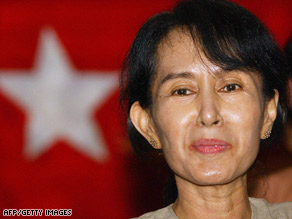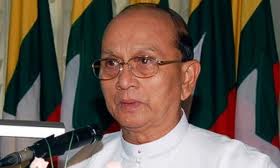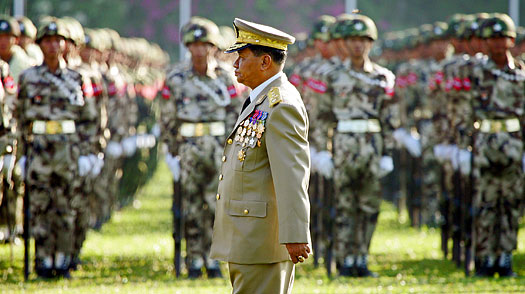 Suu Kyi’s decision to personally contest the April polls is the latest vote of confidence for government reforms that include the legalisation of labour unions, increasing press freedom and opening a dialogue with Suu Kyi herself. Party spokesman Nyan Win said Tuesday that Suu Kyi announced during a party meeting on Monday that she would seek a parliamentary seat in the Yangon suburb of Kawhmu. Yangon is Myanmar’s largest city and Suu Kyi’s hometown. As recently as last week, Suu Kyi declined to confirm whether she would personally contest a seat, telling The Associated Press in an interview that her decision would be announced later this month. She also expressed cautious optimism about the government’s reforms. ”I think there are obstacles, and there are some dangers that we have to look out for,” Suu Kyi said. ”I am concerned about how much support there is in the military for changes.
Suu Kyi’s decision to personally contest the April polls is the latest vote of confidence for government reforms that include the legalisation of labour unions, increasing press freedom and opening a dialogue with Suu Kyi herself. Party spokesman Nyan Win said Tuesday that Suu Kyi announced during a party meeting on Monday that she would seek a parliamentary seat in the Yangon suburb of Kawhmu. Yangon is Myanmar’s largest city and Suu Kyi’s hometown. As recently as last week, Suu Kyi declined to confirm whether she would personally contest a seat, telling The Associated Press in an interview that her decision would be announced later this month. She also expressed cautious optimism about the government’s reforms. ”I think there are obstacles, and there are some dangers that we have to look out for,” Suu Kyi said. ”I am concerned about how much support there is in the military for changes.
Genuinely committed to reforms?
 The rising optimism in the country stems mainly from the fact that new president appears to be genuinely committed to reforms. He has not only made policy statements calling for political reconciliation, strengthening of democratic practices and economic reforms, but also followed them up with action. He has taken the extraordinary step of meeting with Ms Suu Kyi and inviting her to dinner in the new presidential residence. Observers agree that the photograph that appeared in Myanmar papers, of President Thein Sein standing with Ms Suu Kyi in front of the official portrait of General Aung San, her father and a national hero, sends a positive signal. Ms Suu Kyi herself has confirmed that there is a sense of spring in the air. In her speech marking the International Day of Democracy, she told her audience: “I believe we have reached a point where there is opportunity for change.” She also told AFP the new government appeared genuine in its desire for democratic reform, and that an Arab-style uprising was not the answer to the country’s problems.
The rising optimism in the country stems mainly from the fact that new president appears to be genuinely committed to reforms. He has not only made policy statements calling for political reconciliation, strengthening of democratic practices and economic reforms, but also followed them up with action. He has taken the extraordinary step of meeting with Ms Suu Kyi and inviting her to dinner in the new presidential residence. Observers agree that the photograph that appeared in Myanmar papers, of President Thein Sein standing with Ms Suu Kyi in front of the official portrait of General Aung San, her father and a national hero, sends a positive signal. Ms Suu Kyi herself has confirmed that there is a sense of spring in the air. In her speech marking the International Day of Democracy, she told her audience: “I believe we have reached a point where there is opportunity for change.” She also told AFP the new government appeared genuine in its desire for democratic reform, and that an Arab-style uprising was not the answer to the country’s problems.
Economic awakening
 Myanmar’s economy too is beginning to stir from the deep slumber of decades of stagnation brought about first by General Ne Win’s misguided policies and his experiment with “The Burmese Way to Socialism” and subsequently the sanctions imposed by the US and EU. According to reports in Xinhua and the BBC, Myanmar received a record US $20bn in foreign investment in the past year alone: $10.2bn was in the oil and gas sector, $8.2bn in electric power, $1.4bn in mining and $66.32m in manufacturing. The leading investors are China with $7.8bn, Hong Kong with $5.8bn, South Korea with $2.7bn, Thailand with $2.1bn, Britain with $799m and Singapore with $226m. The statistics are a reflection of the fact that Myanmar is a resource-rich country and that it can attract investors despite Western sanctions, which have clearly been a failure on all fronts. A pro-business approach could have provided the West an opportunity to promote more political, civil and economic freedom in Myanmar.
Myanmar’s economy too is beginning to stir from the deep slumber of decades of stagnation brought about first by General Ne Win’s misguided policies and his experiment with “The Burmese Way to Socialism” and subsequently the sanctions imposed by the US and EU. According to reports in Xinhua and the BBC, Myanmar received a record US $20bn in foreign investment in the past year alone: $10.2bn was in the oil and gas sector, $8.2bn in electric power, $1.4bn in mining and $66.32m in manufacturing. The leading investors are China with $7.8bn, Hong Kong with $5.8bn, South Korea with $2.7bn, Thailand with $2.1bn, Britain with $799m and Singapore with $226m. The statistics are a reflection of the fact that Myanmar is a resource-rich country and that it can attract investors despite Western sanctions, which have clearly been a failure on all fronts. A pro-business approach could have provided the West an opportunity to promote more political, civil and economic freedom in Myanmar.
Political arragements
 A quarter of parliament’s seats are taken up by unelected military officials while the Union Solidarity and Development Party, which is packed with former military men, holds about 80 per cent of the remainder. Suu Kyi was released a few days after the 2010 poll, having spent much of the past two decades in detention.Since coming to power in March, the new military-backed government, dominated by former generals, has made a series of reformist moves in an apparent attempt to reach out to political opponents and the West.These included releasing hundreds of political prisoners, holding dialogue with the opposition, suspending construction of an unpopular “mega-dam” and pursuing peace deals with armed ethnic minority rebels.The NLD won an election in 1990 by a landslide, while Suu Kyi remained under house arrest, but the ruling generals never allowed the party to take power.A total of 48 seats are up for grabs in the April vote, not enough to threaten the resounding majority held by the ruling party.The polls are to fill places vacated by those elected in the 2010 polls who have since become ministers and deputy ministers in the government.
A quarter of parliament’s seats are taken up by unelected military officials while the Union Solidarity and Development Party, which is packed with former military men, holds about 80 per cent of the remainder. Suu Kyi was released a few days after the 2010 poll, having spent much of the past two decades in detention.Since coming to power in March, the new military-backed government, dominated by former generals, has made a series of reformist moves in an apparent attempt to reach out to political opponents and the West.These included releasing hundreds of political prisoners, holding dialogue with the opposition, suspending construction of an unpopular “mega-dam” and pursuing peace deals with armed ethnic minority rebels.The NLD won an election in 1990 by a landslide, while Suu Kyi remained under house arrest, but the ruling generals never allowed the party to take power.A total of 48 seats are up for grabs in the April vote, not enough to threaten the resounding majority held by the ruling party.The polls are to fill places vacated by those elected in the 2010 polls who have since become ministers and deputy ministers in the government.
Related Stories
Burma: Zargana freed from prison
Exiled Burmese ” allowed home” says President of Burma





